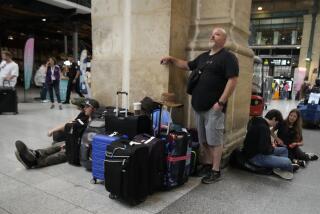Plans for Olympics Unaltered
Olympic and government officials around the world, reacting to the synchronized bomb blasts that damaged a police station near Athens before dawn Wednesday, expressed confidence in security planning for the 2004 Summer Games. The Games will go on, they said, and their teams will be there.
U.S. Olympic Committee officials, reiterating a position they have made clear repeatedly in recent weeks, said they have no intent of withdrawing the American team from the Games, which begin Aug. 13. “We have every expectation and every reason to believe our team will be in Athens in August. There is no consideration being given to withdrawing from the Games,” USOC spokesman Darryl Seibel said.
Officials in other nations, including British Prime Minister Tony Blair and French President Jacques Chirac, said they fully intend for their teams to be in Athens, according to published accounts. Greek Prime Minister Costas Karamanlis, due to meet May 20 at the White House with President Bush in part to discuss Games security, called the explosion an “isolated incident.”
No one was hurt. The area of the explosion in an Athens suburb is not close to any Olympic venues.
Greek officials -- as well as security experts familiar with planning for the 2004 Games -- have often said that such attacks are a recurring, if not regular, facet of life in and around Athens. Greek authorities said Wednesday that the attack, probably the work of local anarchists, was no cause for particular Games-related concern.
The timing, however, was awkward. The public relations hit, officials conceded, was likely to prove considerable, considering the blasts occurred despite a massive security build-up for the Games, involving more than 50,000 Greek police and soldiers as well as NATO and costing what is likely to exceed $1 billion.
Today marks 99 days to go until the opening ceremony. The bombs went off on the 100-day-to-go mark -- as Greece’s top law enforcement official, George Voulgarakis, the public order minister, was in Washington to begin a series of meetings reviewing Games security plans with top U.S. law enforcement officials
Athens Mayor Dora Bakoyannis, in Paris to promote the Games, said the bombs were “designed to take advantage of the 100-day countdown to attract the attention of the international press.”
Echoed John Coates, president of the Australian Olympic Committee, “It appears whoever is responsible for launching this attack chose to do so with 100 days to go.... That is disturbing.”
Moreover, the attack came the week after the International Olympic Committee announced it had arranged for a $170-million insurance policy to cover the risk of a terrorist attack or natural disaster stopping the Games. The IOC has insisted the timing is mere coincidence and that it had been in the market for such a policy for years.
The 2004 Games mark the first Summer Olympics since the Sept. 11, 2001, terrorist attacks in New York and near Washington.
IOC spokeswoman Giselle Davies said, “The IOC understands from the Greek authorities that nothing learned so far indicates this morning’s incident was related to preparations for this summer’s Olympic Games. We remain in contact with our Greek colleagues, who will keep us informed of any developments.”
Small, often homemade, bombs go off in Greece with a frequency that would be unthinkable in many other countries. Typically, according to security experts familiar with the 2004 Games security plan, such incidents deserve only a measured, cautious response and not full-scale alarm.
Such incidents are so regular that there’s even a word in the Greek language for this kind of arson: gazakia. It typically describes a bomb that goes off after a warning to the authorities, explodes in the late night or early morning hours and is aimed at property, often government installations or automated teller machines.
Last month, a homemade bomb destroyed a car belonging to a Cypriot diplomat in Salonika.
In March, Greek police used a controlled explosion to destroy a device that had been hidden in a backpack and placed outside a Citibank branch in a northeastern Athens suburb. A group calling itself Revolutionary Struggle claimed responsibility for the bomb in a call to the Athens newspaper Eleftherotypia.
On Sept. 5, the same group claimed credit for two time bombs that exploded at Athens’ main court complex.
Those blasts are thought to be linked to the ongoing trials of members of Greece’s deadliest domestic terrorist group, called 17 November. It operated with impunity for more than two decades before being broken up last year.
At 3:47 a.m. local time Wednesday, according to Greek officials, Eleftherotypia got another call, warning of an impending explosion at the back side of the Kallithea station.
The first bomb went off at 3:55 in back of the station, according to Greek authorities and the Athens News Agency. The back entrance hasn’t been used for the last year, authorities said.
The second followed about 4 a.m. at the same site. The third went off nearby, at 4:29. It had been placed between a vehicle and a garbage can.
“Greece is a safe country,” the alternate minister of culture, Fani Palli Petralia, said in a statement distributed by Athens 2004 organizers. “That was an incident that had nothing to do with the Olympic Games.”
She added that Athens would be “the safest city” during the Olympics and said, “We will absolutely make safe Games.”
More to Read
Go beyond the scoreboard
Get the latest on L.A.'s teams in the daily Sports Report newsletter.
You may occasionally receive promotional content from the Los Angeles Times.






